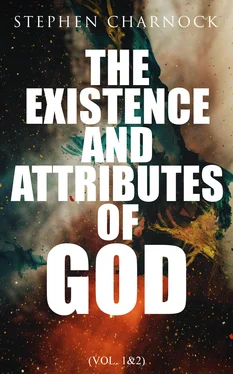Stephen Charnock - The Existence and Attributes of God (Vol. 1&2)
Здесь есть возможность читать онлайн «Stephen Charnock - The Existence and Attributes of God (Vol. 1&2)» — ознакомительный отрывок электронной книги совершенно бесплатно, а после прочтения отрывка купить полную версию. В некоторых случаях можно слушать аудио, скачать через торрент в формате fb2 и присутствует краткое содержание. Жанр: unrecognised, на английском языке. Описание произведения, (предисловие) а так же отзывы посетителей доступны на портале библиотеки ЛибКат.
- Название:The Existence and Attributes of God (Vol. 1&2)
- Автор:
- Жанр:
- Год:неизвестен
- ISBN:нет данных
- Рейтинг книги:3 / 5. Голосов: 1
-
Избранное:Добавить в избранное
- Отзывы:
-
Ваша оценка:
- 60
- 1
- 2
- 3
- 4
- 5
The Existence and Attributes of God (Vol. 1&2): краткое содержание, описание и аннотация
Предлагаем к чтению аннотацию, описание, краткое содержание или предисловие (зависит от того, что написал сам автор книги «The Existence and Attributes of God (Vol. 1&2)»). Если вы не нашли необходимую информацию о книге — напишите в комментариях, мы постараемся отыскать её.
The Existence and Attributes of God (Vol. 1&2) — читать онлайн ознакомительный отрывок
Ниже представлен текст книги, разбитый по страницам. Система сохранения места последней прочитанной страницы, позволяет с удобством читать онлайн бесплатно книгу «The Existence and Attributes of God (Vol. 1&2)», без необходимости каждый раз заново искать на чём Вы остановились. Поставьте закладку, и сможете в любой момент перейти на страницу, на которой закончили чтение.
Интервал:
Закладка:
2. Without being rooted in this, we cannot order our lives. All our baseness, stupidity, dulness, wanderings, vanity, spring from a wavering and unsettledness in this principle. This gives ground to brutish pleasures, not only to solicit, but conquer us. Abraham expected violence in any place where God was not owned (Gen. xx. 11), “Surely the fear of God is not in this place, and they will slay me for my wife’s sake.” The natural knowledge of God firmly impressed, would choke that which would stifle our reason and deface our souls. The belief that God is, and what he is, would have a mighty influence to persuade us to a real religion, and serious consideration, and casting about how to be like to him and united with him.
3. Without it we cannot have any comfort of our lives. Who would willingly live in a stormy world, void of a God? If we waver in this principle, to whom should we make our complaints in our afflictions? Where should we meet with supports? How could we satisfy ourselves with the hopes of a future happiness? There is a sweetness in the meditation of his existence, and that he is a Creator. 131Thoughts of other things have a bitterness mixed with them: houses, lands, children, now are, shortly they will not be; but God is, that made the world: his faithfulness as he is a Creator, is a ground to deposit our souls and concerns in our innocent sufferings. 132So far as we are weak in the acknowledgment of God, we deprive ourselves of our content in the view of his infinite perfections.
4. Without the rooting of this principle, we cannot have a firm belief of Scripture. The Scripture will be a slight thing to one that hath weak sentiments of God. The belief of a God must necessarily precede the belief of any revelation; the latter cannot take place without the former as a foundation. We must firmly believe the being of a God, wherein our happiness doth consist, before we can believe any means which conduct us to him. Moses begins with the Author of creation, before he treats of the promise of redemption. Paul preached God as a Creator to a university, before he preached Christ as Mediator. 133What influence can the testimony of God have in his revelation upon one that doth not firmly assent to the truth of his being? All would be in vain that is so often repeated, “Thus saith the Lord,” if we do not believe there is a Lord that speaks it. There could be no awe from his sovereignty in his commands, nor any comfortable taste of his goodness in his promises. The more we are strengthened in this principle, the more credit we shall be able to give to divine revelation, to rest in his promise, and to reverence his precept; the authority of all depends upon the being of the Revealer.
To this purpose, since we have handled this discourse by natural arguments,
1. Study God in the creatures as well as in the Scriptures. The primary use of the creatures, is to acknowledge God in them; they were made to be witnesses of himself in his goodness, and heralds of his glory, which glory of God as Creator “shall endure forever” (Psalm civ. 31): that whole psalm is a lecture of creation and providence. The world is a sacred temple; man is introduced to contemplate it, and behold with praise the glory of God in the pieces of his art. As grace doth not destroy nature, so the book of redemption blots not out that of creation. Had he not shown himself in his creatures, he could never have shown himself in his Christ; the order of things required it. God must be read wherever he is legible; the creatures are one book, wherein he hath writ a part of the excellency of his name, 134as many artists do in their works and watches. God’s glory, like the filings of gold, is too precious to be lost wherever it drops: nothing so vile and base in the world, but carries in it an instruction for man, and drives in further the notion of a God. As he said of his cottage, Enter here, Sunt hic etiam Dii , God disdains not this place: so the least creature speaks to man, every shrub in the field, every fly in the air, every limb in a body; Consider me, God disdains not to appear in me; he hath discovered in me his being and a part of his skill, as well as in the highest. The creatures manifest the being of God and part of his perfections. We have indeed a more excellent way, a revelation setting him forth in a more excellent manner, a firmer object of dependence, a brighter object of love, raising our hearts from self‑confidence to a confidence in him. Though the appearance of God in the one be clearer than in the other, yet neither is to be neglected. The Scripture directs us to nature to view God; it had been in vain else for the apostle to make use of natural arguments. Nature is not contrary to Scripture, nor Scripture to nature; unless we should think God contrary to himself who is the Author of both.
2. View God in your own experiences of him. There is a taste and sight of his goodness, though no sight of his essence. 135By the taste of his goodness you may know the reality of the fountain, whence it springs and from whence it flows; this surpasseth the greatest capacity of a mere natural understanding. Experience of the sweetness of the ways of Christianity is a mighty preservative against atheism. Many a man knows not how to prove honey to be sweet by his reason, but by his sense; and if all the reason in the world be brought against it, he will not be reasoned out of what he tastes. Have not many found the delightful illapses of God into their souls, often sprinkled with his inward blessings upon their seeking of him; had secret warnings in their approaches to him; and gentle rebukes in their consciences upon their swervings from him? Have not many found sometimes an invisible hand raising them up when they were dejected; some unexpected providence stepping in for their relief; and easily perceived that it could not be a work of chance, nor many times the intention of the instruments he hath used in it? You have often found that he is, by finding that he is a rewarder, and can set to your seals that he is what he hath declared himself to be in his word (Isa. xliii. 12): “I have declared, and have saved; therefore you are my witnesses, saith the Lord, that I am God.” The secret touches of God upon the heart, and inward converses with him, are a greater evidence of the existence of a supreme and infinitely good Being, than all nature.
Use IV. Is it a folly to deny or doubt of the being of God? It is a folly also not to worship God, when we acknowledge his existence; it is our wisdom then to worship him. As it is not indifferent whether we believe there is a God or no; so it is not indifferent whether we will give honor to that God or no. A worship is his right as he is the Author of our being, and fountain of our happiness. By this only we acknowledge his Deity; though we may profess his being, yet we deny that profession in neglects of worship. To deny him a worship is as great a folly, as to deny his being. He that renounceth all homage to his Creator, envies him the being which he cannot deprive him of. The natural inclination to worship is as universal as the notion of a God; idolatry else had never gained footing in the world. The existence of God was never owned in any nation, but a worship of him was appointed. And many people who have turned their backs upon some other parts of the law of nature, have paid a continual homage to some superior and invisible being. The Jews give a reason why man was created in the evening of the Sabbath, because he should begin his being with the worship of his Maker. As soon as ever he found himself to be a creature, his first solemn act should be a particular respect to his Creator. “To fear God and keep his commandment,” is the whole of man, 136or is whole man; 137he is not a man but a beast, without observance of God. Religion is as requisite as reason to complete a man: he were not reasonable if he were not religious; because by neglecting religion, he neglects the chiefest dictate of reason. Either God framed the world with so much order, elegancy, and variety to no purpose, or this was his end at least, that reasonable creatures should admire him in it, and honor him for it. The notion of God was not stamped upon men, the shadows of God did not appear in the creatures, to be the subject of an idle contemplation, but the motive of a due homage to God. He created the world for his glory, a people for himself, that he might have the honor of his works; that since we live and move in him, and by him, we should live and move to him and for him. It was the condemnation of the heathen world, that when they knew there was a God, they did not give him the glory due to him. 138He that denies his being, is an atheist to his essence: he that denies his worship, is an atheist to his honor.
Читать дальшеИнтервал:
Закладка:
Похожие книги на «The Existence and Attributes of God (Vol. 1&2)»
Представляем Вашему вниманию похожие книги на «The Existence and Attributes of God (Vol. 1&2)» списком для выбора. Мы отобрали схожую по названию и смыслу литературу в надежде предоставить читателям больше вариантов отыскать новые, интересные, ещё непрочитанные произведения.
Обсуждение, отзывы о книге «The Existence and Attributes of God (Vol. 1&2)» и просто собственные мнения читателей. Оставьте ваши комментарии, напишите, что Вы думаете о произведении, его смысле или главных героях. Укажите что конкретно понравилось, а что нет, и почему Вы так считаете.












